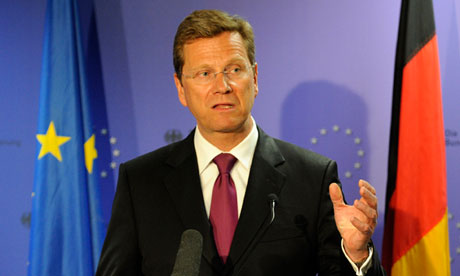Prime minister's call to transform terms of Britain's EU membership receives frosty reception from European leaders
David Cameron swiftly encountered a solid wall of European opposition to his demands to be allowed to "pick and choose" what Britain wants from its membership of the EU as his continental partners worried about being plunged into years of uncertainty over the union's third-biggest state.
The prime minister's ultimatum demanding a new deal for Britain, failing which the rest of the EU would "be diminished" by a possible British exit, brought absolutely no welcome anywhere in the EU except perhaps in the Czech Republic, and a welter of criticism from the main powers.
"Cherry-picking what you want from Brussels is not an option," said the German foreign minister, Guido Westerwelle.
The French president, François Hollande, told his cabinet in Paris that being an EU member "brought obligations", according to an Elysée Palace spokeswoman.
The French foreign minister, Laurent Fabius, said: "You can't do Europeà la carte," adding mischievously that Paris would roll out the red carpet to fleeing UK businesses if Britain quit the EU.
"I'll take an example which our British friends will understand. Let's imagine Europe is a football club and you join. Once you're in it you can't say: 'Let's play rugby'."
Casting himself as Europe's great modern heretic and iconoclast daring to think the unthinkable, Cameron both pledged his allegiance to a reformed EU while warning Britain would probably quit if it defied his challenge.
Senior German politicians complained that Cameron could "paralyse" the union "for years" by leaving Britain in a form of European limbo until well after the next general election – expected in 2015.
Sweden, under a conservative government that is a natural ally of Downing Street, argued that you could not have an EU that ran at 28 different speeds.
Senior officials in Brussels were alarmed that the British gambit would serve as a colossal distraction from the effort to cope with Europe's worst ever crisis – over sovereign debt and the viability of the single currency.
"Negotiation of a new 'settlement' will open a Pandora's box of demands from all over the EU," said a senior EU official. "There will be huge expenditure of time and effort at a time when economic and international challenges place enormous demands on Europe's governmental machines."
No "cherry-picking", no "à la carte", and warnings of a "Pandora's box" were the most common responses elsewhere in the EU to a speech which may make or break Cameron's career as well as deciding Britain's European fate.
"David Cameron has turned a deaf ear to those in his own country as well as abroad who warned he should be wary of such a move away [from Europe]," said the leading French newspaper, Le Monde.
Central to Cameron's strategy is to seek to use EU negotiations over eurozone political integration by 2016 to secure a new settlement for Britain, pass enabling legislation quickly, and stage an in-out referendum by the midway point of a new parliament, if the Tories are returned to government in 2015.
There is absolutely no sign, however, that the big European powers are prepared to calibrate their eurocrisis responses to Cameron's timetable nor to have their policy priorities hijacked by haggling over British "opt-outs".
On Tuesday in Berlin, Hollande and the German chancellor, Angela Merkel, promised to deliver joint proposals on eurozone reform within four months, rather than Cameron's four years.
Despite the mounting opposition to the British case, there is anxiety in France that Berlin might nonetheless toy with the notion of indulging the UK arguments for tactical gain and there was broad relief on Wednesday that Cameron avoided spelling out specifically which powers he wanted "repatriating" from Brussels.
Even before coming up with new demands, Cameron faces problems over what to do about 130 Lisbon treaty instruments governing justice and police affairs in the EU. By next year Britain has to decide whether to exercise its opt-out from the legislation en bloc before deciding which parts it would then nonetheless prefer to observe. That re-entry needs to be negotiated with Britain's EU partners.
Senior sources in Brussels say the commissioners in Brussels overseeing the justice and police portfolios are determined to make things difficult

No comments:
Post a Comment